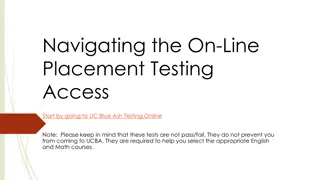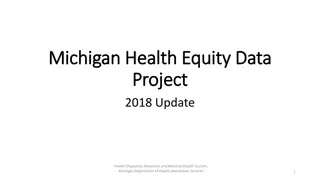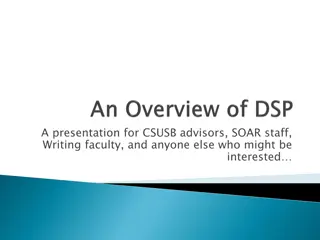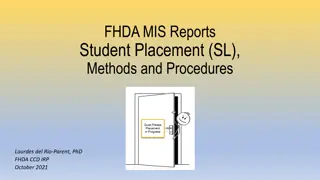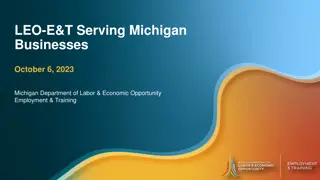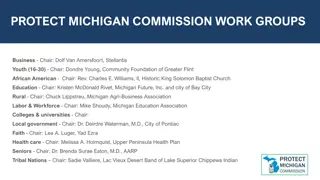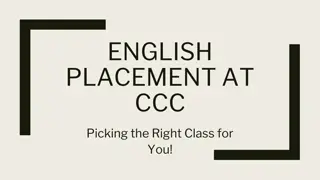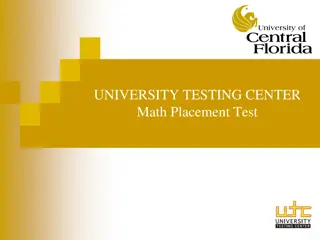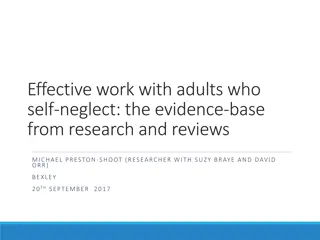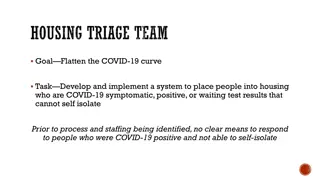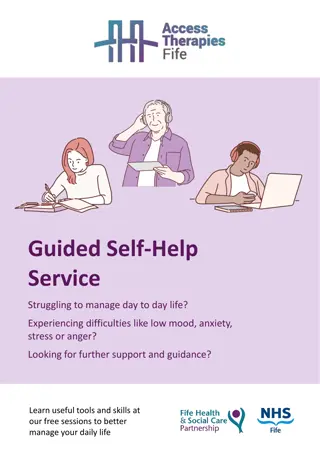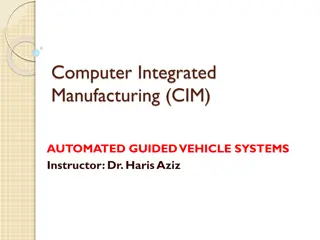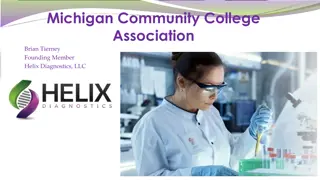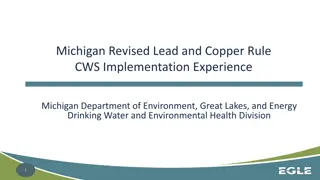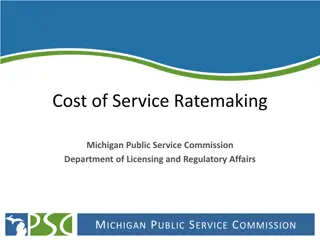Michigan Guided Self-Placement Recommendations
Michigan's Center for Student Success advocates for a Guided Self-Placement approach for college English and mathematics courses. Recommendations include using high school GPA for placement, offering corequisite support, and discontinuing universal testing and prerequisite courses. The state aims to ensure equitable access to credit-bearing courses through consistent placement policies.
Download Presentation

Please find below an Image/Link to download the presentation.
The content on the website is provided AS IS for your information and personal use only. It may not be sold, licensed, or shared on other websites without obtaining consent from the author. Download presentation by click this link. If you encounter any issues during the download, it is possible that the publisher has removed the file from their server.
E N D
Presentation Transcript
Guided Self- Placement: Michigan Context August 10, 2022 Michigan Center for Student Success
Michigan Developmental Education and Michigan Developmental Education and Placement Recommendations (MDEPR) Placement Recommendations (MDEPR) 1. Discontinue practice of universal testing for mandatory placement in developmental courses 2. Discontinue use of prerequisite developmental courses and course sequences 3. Use high school GPA of 2.5 or better (self-reporting is okay) to place students directly into gateway English and mathematics courses 4. For those who need or want it, provide corequisite support designed to help students complete gateway courses in a single semester 5. For students who are extremely unlikely to be successful in a single-semester corequisite model, additional support should be provided through models that are offered at no cost and that can be completed prior to matriculation or within a single semester 6. Use a robust Guided Self-Placement (GSP) process to determine who needs what levels of support
While PA 84 specified criteria for the accelerated delivery of developmental coursework, it did not speak to specific criteria for placement. Instead, the bill mandated a working group be formed to: Michigan Michigan Reconnect Reconnect Grant Act Grant Act Placement Placement Language Language (A) Identify placement practices and policies that ensure students know when remediation is required, what types of academic and nonacademic supports will be available during remediation, and when they can expect to complete credit-bearing English and mathematics courses. Policies must emphasize placement in college-level courses for as many students as possible, with students requiring remediation being placed in appropriate programs. (B) Encourage eligible institutions across this state to adopt consistent placement polices. (C) Clearly communicate sound policies for course placement and options for remedial courses.
Michigan GSP Michigan GSP Workgroup Workgroup In September 2021, MCSS convened a statewide workgroup to provide guidelines to help colleges develop and implement high-quality, equitable GSP approaches. The workgroup was composed of K-12 and college practitioners including faculty, advisors, and administrators. The group met three times in September and October and released a set of guidelines in November.
A Note on Scope A Note on Scope The scope of the GSP Work Group was intentionally limited to the context of the MDEPR and the group did not address the broader content of the legislation The goal for the group was to lay the groundwork for colleges to do the best possible job with design and implementation of an equitable and effective GSP process aligned to the broader recommendations of the MDEPR
MI GSP Principles MI GSP Principles Institutions develop and administer an asset-based process to help students make informed choices regarding course selection and provision of support in gateway English composition and mathematics pathway courses Students make the final selection of their initial program-applicable English composition and mathematics pathway courses and whether to elect or decline any available support Faculty and staff collaborate in the design, implementation, and refinement of supports and GSP policies and practices Information about gateway course options, placement, and provision of support are explicitly defined and are easy to access, understand, and communicate for all students and other stakeholders The GSP process and policies are evaluated, reviewed, and revised on a regular basis
Dawn Coleman, Ph.D Coleman Evaluation
Three main goals identified: Determine whether a student has the foundational knowledge and skills needed for the course into which they are placed To place students into a class that is not too hard but not too easy (the sweet spot) To place students into a course where they can be successful Perspectives on the General Goals of Placement Processes from Michigan CC Faculty Other goals that were discussed: Create homogenous classes Place as many students into the college level course as possible
Perspectives on GSP (Strengths): Strongly Agree Agree Students are generally capable of making well informed choices about their own placement. 3% 34% 36% It is relatively easy and straightforward to place students 4% 33% 36% using GSP. GSP starts students off on the right foot in college with a conversation about their strengths and challenges. 8% 75% 83% GSP leads to less resistance from students in developmental and co-requisite support courses, 10% 66% 77% Placement using GSP reduces equity gaps in placement compared to placement tests. 3% 50% 53% Placement using GSP results in the appropriate placement 1% 47% 48% for most students.
Perspectives on GSP (Challenges): Strongly Agree Agree The resources needed (time, money, staffing, etc.) to place students using GSP are reasonable. 8% 62% 70% It is difficult to implement GSP consistently because it is dependent on who is guiding the students. 14% 66% 80% Whoever is guiding the GSP process may inappropriately influence students' choices. 16% 73% 89% Most students will not spend the time and money to take a developmental or co-requisite support course if they are not required to take, even if they need the support. 31% 50% 81%
Perspectives on GSP (Concerns): Strongly Agree Agree With GSP, many students will underestimate their abilities and place themselves too low. 6% 37% 43% With GSP, many students will overestimate their abilities and place themselves too high. 10% 60% 70% With GSP, more students will fail the college level 7% 50% 56% math/writing course. 14% 37% 51% GSP is a return to the "right to fail" (aka "sink or swim").
What are you planning and what do you hope to learn today?
Links from the Session Oakland GSP Video: https://www.youtube.com/watch?v=XEFz1kTno_E CCRC Study: Informed Self-Placement Today: An Exploratory Study of Student Outcomes and Placement Practices (columbia.edu) Strong Start to Finish GSP Study: https://strongstart.org/resource/developmental-education-self- placement-approaches/


